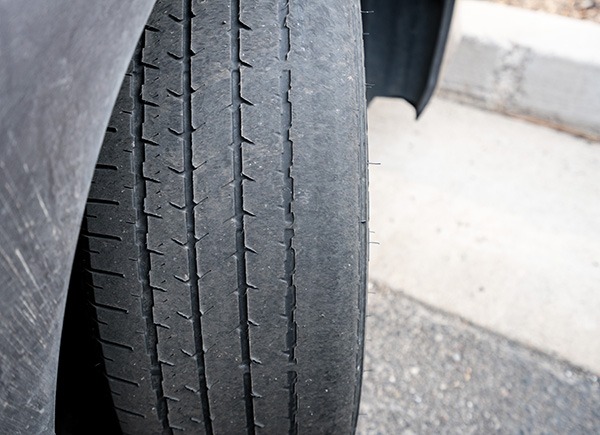
Tires are one of the most critical components of your vehicle, yet they can be overlooked when it comes to regular maintenance. Proper tire care can save you money in the long run by extending your tires' lifespan and improving your vehicle's safety and performance. If you’re looking to get the most out of your tires, there are several simple yet effective steps you can take. Let’s look into seven key maintenance tips that will help you keep your tires in excellent condition for as long as possible.
1. Regularly Check Tire Pressure
One of the simplest yet most important maintenance tasks is checking your tire pressure. Underinflated tires wear out faster, increase fuel consumption, and can even cause blowouts. On the other hand, overinflated tires can lead to uneven wear and reduce traction. Ideally, you should check your tire pressure at least once a month and before long trips.
Make sure to use a reliable tire pressure gauge and compare the readings with your vehicle’s recommended PSI (pounds per square inch), which can be found in your owner’s manual or on the driver’s side door jamb. Properly inflated tires not only last longer but also improve fuel efficiency and enhance overall vehicle performance.
2. Rotate Your Tires Regularly
Tire rotation is essential for promoting even wear across all four tires. Since the weight distribution on your vehicle is not always even, the tires can wear unevenly if they’re not rotated. For instance, front tires tend to wear out faster because they bear more weight and handle steering duties.
Rotating your tires every 5,000 to 7,500 miles or with every oil change ensures that all tires wear at a consistent rate. This can greatly extend the life of your tires and improve the vehicle's handling and stability. Don’t forget to include a tire rotation when scheduling regular maintenance.
3. Balance and Align Your Wheels
Unbalanced or misaligned wheels can significantly shorten tire life. Wheel balancing ensures that the weight of your vehicle is evenly distributed across your tires, preventing uneven wear and tear. You may need balancing if you notice vibrations while driving, especially at higher speeds.
Similarly, wheel alignment adjusts the angles of your tires so they make proper contact with the road. Misalignment can cause rapid or uneven tire wear, which can compromise your car’s handling. If you notice your vehicle pulling to one side or uneven tire tread, it might be time for an alignment check.
4. Inspect Tire Tread Regularly
The tread on your tires is what provides grip and traction on the road. Driving with worn-out treads not only reduces the tire’s lifespan but also compromises safety, especially in wet or slippery conditions. The easiest way to check tread depth is by using the "penny test." Insert a penny into the tread with Lincoln’s head facing down—if you can see the top of his head, it’s time to replace your tires.
Some tires also come with tread wear indicators, small bars that become visible once the tread has worn down to a certain level. Regularly inspecting your tire tread can prevent accidents and ensure you’re driving on tires that can handle various road conditions.
5. Avoid Overloading Your Vehicle
Overloading your vehicle puts excessive pressure on your tires, which can lead to premature wear and even tire failure. Each tire has a load index, which specifies the maximum weight it can support. Exceeding this limit generates extra heat, causing the tire to degrade faster.
Before packing your car for a road trip or transporting heavy items, check your vehicle’s maximum load capacity, typically found in the owner’s manual. By avoiding overloading, you can protect your tires and maintain a safer driving experience.
6. Drive Smoothly and Avoid Aggressive Driving
How you drive has a significant impact on tire life. Rapid acceleration, hard braking, and sharp cornering can cause excessive wear on your tires. These aggressive driving habits increase the friction between the tires and the road, wearing down the rubber faster than normal.
To extend the lifespan of your tires, practice smooth and controlled driving. This includes gradually accelerating, braking gently, and taking turns at a moderate speed. Not only will this reduce wear on your tires, but it will also improve fuel efficiency and contribute to a safer driving experience.
7. Store Tires Properly When Not in Use
If you have a second set of seasonal tires, such as winter tires, proper storage is crucial when they’re not in use. Tires should be stored in a cool, dry place, away from direct sunlight and any sources of heat. Exposure to extreme temperatures and UV rays can cause the rubber to degrade over time, even if the tires are not in use.
When storing tires, it’s best to keep them off the ground using tire racks or shelves. If you’re stacking them, avoid placing too much weight on top, as this can cause deformation. Taking care of your off-season tires will ensure they’re in top condition when it’s time to switch them back on.
Looking to extend the life of your tires? Visit Wes Jackson Automotive for a comprehensive tire maintenance service. From tire rotations to wheel balancing, our experts will help you get the most out of your tires. Book your appointment today!